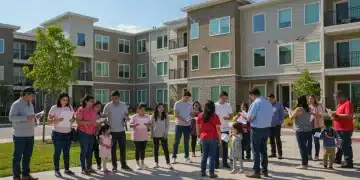Government housing benefits for seniors that you need to know

Government housing benefits for seniors provide crucial financial assistance through subsidized housing, rental aid, and home repair support, helping eligible seniors maintain affordable and secure living conditions.
Government housing benefits for seniors play a crucial role in enhancing their living conditions. Have you ever wondered how these programs can lighten the financial burden? This article will dive into key benefits and resources available for seniors looking for housing assistance.
Understanding government housing benefits
Understanding government housing benefits is vital for seniors seeking financial assistance. These benefits help make housing more affordable so that seniors can live comfortably and securely.
What Are Government Housing Benefits?
Government housing benefits are programs designed to assist low-income individuals and families, particularly seniors, in accessing affordable housing. These programs often provide financial aid in various forms, helping to alleviate the burden of housing costs.
Types of Housing Benefits
There are several types of housing benefits available to seniors:
- Subsidized Housing: This includes public housing and housing choice vouchers (Section 8), which help cover rent costs.
- Rental Assistance: This can provide direct financial support for monthly rent payments, ensuring that seniors can stay in their homes.
- Home Repair Assistance: Programs that offer funding or support for necessary home repairs to keep living spaces safe and comfortable.
These housing benefits help seniors maintain their independence by reducing financial pressure. It’s essential for seniors and their families to stay informed about available programs.
Eligibility Requirements
To qualify for government housing benefits, seniors typically must meet certain criteria, such as income limits and residency status. Understanding these requirements can aid in the application process.
How to Apply
Seniors can apply for housing assistance through various local and federal agencies. Engaging with community resources can be helpful in navigating the application process successfully.
By being informed about their options, seniors can take advantage of these essential government housing benefits and improve their living situations significantly.
Eligibility criteria for seniors
Eligibility for government housing benefits for seniors involves several key factors. Knowing these criteria helps seniors navigate the application process more effectively.
Age and Residency Requirements
To qualify, applicants typically must be at least 62 years old. Additionally, they need to prove residency in the area where they are applying for benefits. These basic requirements ensure that the assistance is directed toward those in need.
Income Limits
Income is a critical factor in determining eligibility. Generally, there are specific income limits that vary by program and location. Many housing programs prioritize helping seniors with very low income. Being below these limits allows for better chances of receiving assistance.
- Check local income guidelines for specific programs
- Provide documentation of income sources
- Consider other financial resources that may affect eligibility
Understanding these parameters allows seniors to prepare their application properly. Apart from age and income, some programs also consider family size and special circumstances.
Special Circumstances
In certain situations, seniors may need to present additional information to support their applications. Examples include being homeless, having a disability, or caring for dependents. These factors can influence eligibility and should be communicated thoroughly.
By familiarizing themselves with these eligibility criteria, seniors can take necessary steps to secure the benefits they require for stable housing.
Types of housing assistance programs

There are various types of housing assistance programs available for seniors, each designed to meet different needs. Understanding these options can help seniors find suitable support for their housing situation.
Subsidized Housing
Subsidized housing is one of the most common forms of assistance. This program helps reduce rent costs for seniors, enabling them to afford their homes. Public housing and housing choice vouchers (Section 8) are examples of this assistance.
- Public Housing: This program offers affordable apartments managed by local public housing authorities.
- Housing Choice Vouchers: Seniors can use these vouchers to rent in the private market, where landlords accept government assistance.
These options provide significant relief for seniors on fixed incomes.
Rental Assistance Programs
Another type of assistance is rental aid, which helps seniors cover their monthly rent. Programs may offer direct payments to landlords or financial aid to the tenants.
Rental assistance is especially crucial for those facing financial difficulties. Eligible seniors can receive support through:
- Emergency rental assistance for those facing eviction
- Short-term aid during financial setbacks
- Ongoing support for low-income households
These programs help ensure housing stability for seniors, allowing them to focus on their well-being.
Home Repair Assistance
Home repair assistance programs are designed to help seniors maintain safe and livable conditions in their homes. These programs often cover essential repairs such as plumbing, heating, and electrical work.
Some key points to note include:
- Grants or low-interest loans may be available for necessary repairs.
- Eligibility typically requires proof of income and ownership status.
- Local nonprofit organizations often administer these programs.
By providing these essential services, home repair assistance programs enable seniors to live independently and safely in their homes.
How to apply for housing benefits
Applying for housing benefits is a crucial step for seniors who need financial assistance. The process may seem daunting, but understanding the steps can make it manageable.
Gather Required Documents
First, seniors need to collect necessary documents for their application. This usually includes identification, proof of income, and residency verification. Proper documentation is essential for proving eligibility.
- Identification: A government-issued ID or driver’s license.
- Income Proof: Pay stubs, tax returns, or Social Security statements.
- Residency Verification: Lease agreements or utility bills showing current address.
Having all these documents ready can speed up the application process significantly.
Visit Local Agencies
Next, seniors should visit local housing authorities or agencies that handle housing benefits. These agencies can provide specific guidance tailored to local programs.
Many agencies offer walk-in services to assist seniors with completing applications. Speaking directly with a representative can clarify any uncertainties about the process.
Complete the Application
Seniors can typically complete the application form either online or in person. When filling out the application:
- Ensure that all information is accurate and up-to-date.
- Double-check entries to prevent mistakes that could delay processing.
- Ask for assistance if needed; many organizations offer help with forms.
Once completed, submit the application as directed. Some programs may require documentation to be mailed or uploaded online, while others accept in-person submissions.
Follow Up on Your Application
After submission, it’s important to follow up with the agency. Checking the status of the application can help identify any additional steps or missing documents. Often, seniors will receive communication about their application status, but proactive follow-up can also ensure timely processing.
By understanding how to apply for housing benefits, seniors can access the resources they need for affordable housing.
Additional resources for senior housing
There are many additional resources available for seniors seeking housing assistance beyond government programs. These resources can provide extra support and valuable information.
Local Nonprofit Organizations
Many local nonprofits focus on helping seniors with housing needs. These organizations often provide information about available programs and may offer direct assistance.
- Financial Counseling: Nonprofits may offer sessions to help seniors understand their financial situation and budgeting for housing.
- Housing Navigation: Some organizations assist seniors in finding suitable housing options and completing applications.
- Community Programs: Many facilities organize housing workshops that educate seniors about their options.
These organizations can be a great first step in finding housing support.
Online Resources
The internet is another valuable tool for seniors seeking housing assistance. Many websites provide information on various programs and resources available.
For example, sites like the U.S. Department of Housing and Urban Development (HUD) offer databases of housing programs and local agencies. Other websites might feature articles detailing the application process and eligibility criteria.
State and Local Housing Authorities
Seniors should also connect with their state or local housing authorities. These agencies manage housing programs and have the latest information on what is available.
Housing authorities can also assist with:
- Finding affordable rental units in the community.
- Providing information on waiting lists for subsidized housing.
- Connecting seniors to supportive services such as transportation and health care.
By utilizing these additional resources, seniors can gain access to the support they need to find and secure affordable housing.
FAQ – Frequently Asked Questions about Government Housing Benefits for Seniors
What are government housing benefits for seniors?
Government housing benefits are programs designed to help seniors afford housing through financial aid, subsidized housing, or rental assistance.
Who is eligible for housing assistance programs?
Eligibility typically requires seniors to be at least 62 years old and meet specific income limits set by the program.
How can seniors apply for housing benefits?
Seniors can apply by gathering required documents, visiting local housing agencies, and completing the application form either online or in person.
What additional resources are available for seniors seeking housing assistance?
In addition to government programs, seniors can explore local nonprofit organizations, online resources, and state housing authorities for further support.





